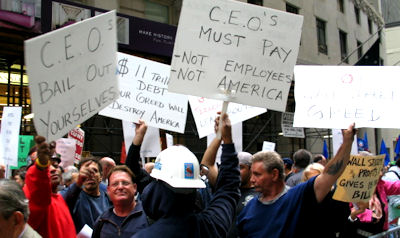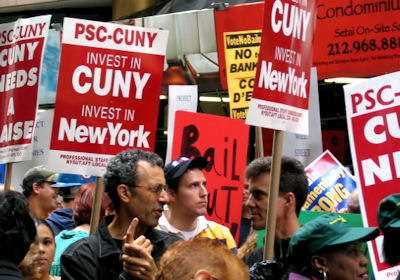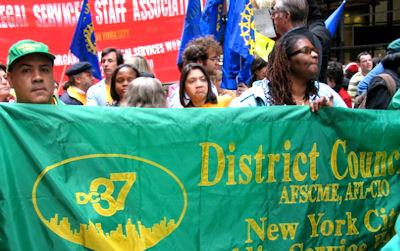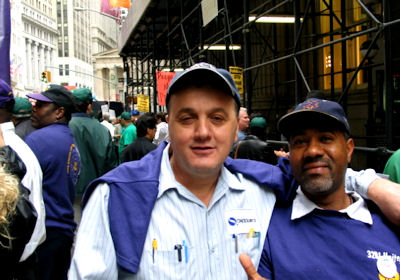Posted September 30, 2008
It has been a turbulent week on Wall Street, and I’m not just talking about stock prices. Two demonstrations last Thursday, at noon and again at 4PM, shook up the streets directly outside the Stock Exchange as several thousand demonstrators protested against the proposed Bush bailout of big finance. First, at noon, approximately 1500 union members and staffers rallied at the intersection of Broad Street and Exchange Place, literally a stones’ throw away from the most sacred temple of American capitalism. The demonstration was called for in a hurry just a day or two before by the NYC Central Labor Council. While they might have done more and sooner – I agree with Jonathan Tasini’s comment on the Working Life blog last Tuesday that the unions should work to “put 100,000 people in the streets in each of 25 major cities” – it was nevertheless good to see the labor bureaucrats finally make a move and stand up for their members. (Also keep in mind, however, that they had little choice – a wide range of social movement and civil society organizations had previously called for demonstrations later in the day and, presumably, the collective union leadership was both afraid of ceding ground to these more radical elements and also feeling a great deal of pressure to take action from the rank-and-file within their own organizations).

The rally itself was encouraging. Speakers included Ed Ott and Gary Labarbera, both of the New York City Central Labor Council; Randi Weingarten, President of the UFT and AFT; Jim Conigliaro, Directing Business Representative of District 15 of the IAM; and John Sweeney of the AFL-CIO, among others. A wide range of unions was represented in the crowd – members from the Teamsters, Teachers, Transit Workers, UAW, RWDSU, PSC, Laborers, AFSCME, SEIU, and various construction trades were all there. Most placards carried generic slogans along the lines of “No Blank Checks for Wall Street,” “Bail Out Main Street, Not Wall Street,” and “Our Hard-Earned Pensions Are Not Up For Grabs”; some supported Obama or, conversely, attacked McCain. But there were also quite a few signs, mostly handwritten and, it seemed to me, carried by members of the various construction trades, which advanced substantially different – and more aggressive – political slogans. These included, prominently, placards reading “Impeach! No More $$$ for Lies!,” “CEOs Bail Out Yourselves,” and “CEOs Must Pay. Not Employees, Not America.” One construction worker’s sign, however, stands out in my mind above all others. Although problematic, it spoke to the depths of the class anger awakened and sharpened by discussion of a Wall Street bailout: “Why Does America Have to Bail Out These Greedy Money Hungry Scum?,” it read.
The speeches offered by Weingarten, Sweeney, and others were, not surprisingly, much closer in content to the tepid slogans advanced by the majority of the crowd rather than the more militant message put forward by the members of the construction trades. While delivered with a great deal of firey rhetoric, they typically went no farther than to call for an economic stimulus plan to bailout “Main Street” and exhorted the assembled union members to support Barack Obama in the upcoming elections. Weingarten, for example, raised “responsibility” and “accountability,” rather than social and economic justice, as catchphrases in her speech: “We know that the economic situation has to be solved,” she said, “But we want a responsible rescue, not an opportunistic bailout… and that means, just like every single boss says to me, that there should be accountability for the teachers, then there should be accountability for Wall Street.”

Sweeney was marginally more aggressive. He declared that “our country is facing the biggest financial disaster since the Great Depression” and noted that “working people have been living this crisis with lost jobs, stagnant wages, crumbling schools and roads and dwindling hopes for our children and eroding health care and disappearing pensions.” Moving onto the offensive, he continued: “Now the Bush administration wants us to pay the freight for a Wall Street bailout that does not even begin to address the roots of our crisis… We want our tax dollars used to provide a hand up for the millions of working people who live on Main Street and not a hand out to the privileged band of overpaid executives on Wall Street.” His swipe at the bankers is of course appreciated; his unbridled enthusiasm for Obama, however, is not.
More militant speakers included Ott, Conigliaro, and Bertha Lewis of ACORN. Conigliaro pointed to the experience of the IAM in the aftermath of September 11, 2001, when the government bailed out several airlines which then proceeded to demand various concessions from workers, as a warning for the future if the current financial bailout is approved and a veiled (perhaps accidental?) reminder that the interests of workers and bosses are diametrically opposed. He added: “I want to know when these C.E.O.’s and managers’ salaries are going to be cut… Tell Congress and the Senate that if they don’t negotiate a good deal for us, we should kick them out.” Bertha Lewis of ACORN, however, impressed me most of those speakers which I heard with her admonishment that “if they don’t give us the kind of deal that we deserve and if they don’t give us a bailout for Main Street and not just Wall Street, they’re going to be shocked when we shut this country down.” Given the politics of ACORN, it is apparent that her words are an empty rhetorical flourish rather than a substantive threat of a mass strike. But it was nonetheless heartening to hear a mainstream community and labor leader raise the notion of “shutting this country down” – language is powerful and if the labor bureaucrats and those around them are not careful when bandying about such words they may very well encourage and ultimately unleash social forces which they will be unable to contain and control.

Overall, then, the event was a success and a step in the right direction. It is important, however, to keep in mind the difference between form and substance in the speeches delivered and the slogans advanced. As a comrade from Freedom Road noted, the aggressive populist rhetoric and style – including a great deal of expletives by Conigliaro in particular – were consciously crafted to appeal to and appease angry union members without advancing any measures other than business as usual. Thus even the most fiery orators ended their remarks with appeals on behalf of Obama.
At the same time, however, the speakers did give voice to the class anger of many in the crowd, and this opening is of the greatest importance. In contrast to the second rally later in the day, which brought out approximately 1500 of the usual cast of characters from the left (including the remnants of the Yippies, with their inane slogan, “Dump Today, Jump Tomorrow”) and which suffered from various strategic and tactical problems which I will not discuss here, the AFL-CIO’s demonstration brought together a sizable number of angry workers from various unions in a protest which although its ostensible target was the Bush bailout proposal in fact served as an indictment of the economic crimes perpetrated by the financial elite in general.
In other words, the rally – as well as yesterday’s demonstration on Wall Street sponsored by 1199/SEIU and TWU Local 100 and featuring speakers including Jesse Jackson, Roger Toussaint, Ott, and Conigliaro – was, in my opinion, qualitatively different from both other union rallies and most mobilizations of the left (i.e. antiwar rallies, etc.) at which I have been present: it reached a much broader audience than most left rallies and, despite the calls for support of Obama, issued much broader demands and more aggressive slogans than most major labor rallies. The financial crisis with which we are faced and the proposed solutions to it touch all sectors of American society. The question now is how to channel the growing anger among union members and others in productive directions and demonstrate to them that neither Obama nor McCain nor, in many cases, the leaders of their own unions stand for them in this crisis. The labor leaders must continue to be pushed to the left, with union activists insisting on massive mobilizations against the bailout to be held after work hours (rather than during the work day) and jointly with social movement organizations. As for the Democrats, their support for the bailout demonstrates without a doubt to which sectors in society they are truly beholden – they have offered the left an excellent opportunity to move onto the offensive and it would be a great mistake to miss it.

